Feces are not only uncomfortable but also painful for those who suffer from them. Sometimes they can even be life-threatening. Nor are they as rare as is commonly believed.
What is fecal stones?

© Nomad_Soul - stock.adobe.com
A Feces (Coprolite) is a mostly round ball of excrement, the size of a cherry stone. The ones that are quite common Sheep droppings - as the vernacular calls them - have the same color as the rest of the manure, but are very hardened. There are several layers of mucus and dried intestinal contents around the hard layer.
Fecal stones settle in blindly ending intestinal sections and curvatures in the large intestine, the diverticula (protrusions of the intestinal wall) and in the rectum. Most of the time, they go away with the bowel movement on their own. However, they become dangerous when they cause diseases such as intestinal obstruction or a breakthrough into the abdominal cavity with subsequent peritonitis.
Fecal stones usually occur in connection with chronic constipation and are then located in the rectum, where they block the intestinal passage and only allow thin stool to pass through. Then the impression arises that the patient is suffering from diarrhea (paradoxical diarrhea). If the feces come off on their own, they often cause intestinal irritation and pain.
causes
The stool thickens to a fecal stone if it is transported too slowly through the intestine due to insufficient intestinal peristalsis and too much fluid is then withdrawn from it. This is mostly the case in people with irregular and chronic constipation. Other causes of the appearance of feces include irritable bowel syndrome, colon cancer, and normal metabolic deposits in the convolutions of the intestine.
Patients with constipation usually do not drink enough fluids or have to take sedating medication, which of course also have a calming effect on the intestinal peristalsis. In addition, they often eat a diet low in fiber, fat and high in sugar, so that not enough stool volume can be built up. Long-term abuse of laxatives and - in the case of diabetics - disruption of the conduction of stimuli due to diabetic polyneuropathy can lead to the formation of fecal stones.
Symptoms, ailments & signs
Fecal stones can hinder the transport of feces through the intestines to such an extent that they cause stabbing colicky pain when the contents of the intestine slide by. If they are deposited in diverticula, they sometimes cause diverticulitis: The permanent pressure of the feces on the intestinal wall leads to ulcers in the intestinal mucosa. If the stone breaks through the intestinal wall, it can cause peritonitis. If diverticulitis spreads to other areas of the intestine, intestinal fistulas and abscesses are often the result.
Since many fecal stones are so hidden that they hardly cause any discomfort, they are sometimes only discovered during an intestinal operation. If they are in the rectum, they can be felt manually during a normal intestinal examination. If they protrude into the intestinal cavity, they can be recognized with the help of an endoscopy. Fecal stones are also usually clearly visible on X-rays.
An ultrasound diagnosis, on the other hand, is not so certain: the bright areas in the image can also indicate gas in the intestine. If the faecal stones disturb the normal intestinal passage of the faeces, they often cause sharp pain in the abdomen. If they are not removed or if they come off automatically, they can cause life-threatening intestinal obstruction. If they cause cracks in the intestinal mucosa, inflammation of the intestinal mucous membrane can occur and - if it penetrates into the abdomen - peritonitis (inflammation of the peritoneum).
Complications
Fecal stones can cause various complications. First of all, there is the risk of an intestinal obstruction, which can subsequently lead to life-threatening complications such as a rupture of the intestine and blood poisoning. In addition, a fecal stone can lead to the development of fecal abscesses, which require further treatment.
In the short term, fecal stones can reduce well-being and cause gastrointestinal complaints. If the digestive system is completely blocked, it can lead to vomiting of feces and thereby infections of the throat. In extreme cases, pneumonia can develop, which in turn is associated with serious complications.
Due to the severity of these complications, rapid therapy is recommended. When treating fecal stones, various complaints can arise. When clearing out a larger ball of feces, an anal tear occurs, which can become inflamed and lead to the development of abscesses.
Laxatives can lead to a mineral deficiency or dehydration in the medium term, accompanied by fatigue and a generally reduced performance. In the case of an intestinal irrigation, the preparations used can cause irritation and other side effects. The preparations used rarely cause allergic reactions and trigger diarrhea, for example.
When should you go to the doctor?
A fecal stone will only encourage you to see a doctor in a few cases, as many fecal stones are very small and very hidden. Sometimes they do not cause any discomfort, except that they can lead to pain when leaving. In addition, small specimens often go unnoticed.
However, if a coprolite is noticed by the person concerned, a visit to the doctor is recommended. The exuding or existing excrement stone of sufficient size manifests itself, for example, with colicky pain, severe pain when defecating, persistent constipation or a miserere. Sometimes it can also be felt over the abdominal wall, provided that it is large enough and is located in an appropriate place in the intestine.
If the excrement has come off, it is necessary to go to the doctor in order to determine the possible urschen. Metabolic diseases or diet can often be the reason. A family doctor can be a first point of contact. A proctologist may be needed to remove feces and examine the bowel.
If the symptoms suggest that the coprolite is still inside, a quick medical examination is advisable. Ultimately, such a condition harbors the possibility of life-threatening complications and sometimes severely restricts those affected because the entire digestive system can be disturbed.
Doctors & therapists in your area
Therapy & Treatment
If there is an intestinal obstruction (ileus), there is a risk to life. It must be eliminated as soon as possible. Diverticulitis and the breakthrough of the feces in the lower abdomen must also be treated as quickly as possible. Often the ball of feces is removed surgically. Surgical intervention is also necessary in the case of fecal deposits in the upper intestinal area.
Stones deposited in the rectum can be removed manually by a specialist or a specially trained nurse or dissolved using several enemas. An evacuation is usually carried out after two failed attempts to remove the ball of feces. The intestinal wall is carefully stimulated with circular movements so that the ball loosens and can be removed with iso-osmular drinking solution.
Even if the patient feels great relief afterwards, the evacuation is usually very painful and perceived as uncomfortable. Colon hydrotherapy (intestinal irrigation) can also be used to flush out fecal stones. Since much more water (about 35 liters) is introduced into the intestine with it than with an enema, additional incrustations from deposited indigestible food components and metabolic waste can be removed.
As a rule, three colonic irrigations are necessary in order to clean the intestinal coils even in otherwise inaccessible places. Since several different water temperatures are used (up to 41 degrees and up to 21 degrees), the intestinal peristalsis is also stimulated. In the case of feces that occur in connection with intestinal diseases, the underlying disease is treated first. The elimination of the constipation takes place through the administration of more or less strong laxatives, a change in diet.
Outlook & forecast
Basically, one can assume that a manure stone can be removed without and with medical help. This results in a favorable prognosis. However, the scope of treatment differs significantly. If there is no severe pain or bleeding, those affected can usually alleviate symptoms by taking self-help measures. Sufficient fluid intake and a diet rich in fiber counteract the problem.
The situation is different with complications such as an intestinal obstruction. In this case there is a mortal danger. Consult a doctor immediately. First, the healthcare professional tries to fix the problem manually. If this does not succeed, an operation is necessary. The last procedure is always given when there is a breakthrough in the lower abdomen. Under no circumstances should patients ignore the typical symptoms. Consultation with a doctor is essential in the event of severe complaints. If you delay the start of treatment for several days, you risk further inflammation. As a result, regular bowel movements are impossible.
Sufferers with chronic constipation are considered prone to the feces. You have been advised to exercise caution. Doctors recommend regular colonic irrigation if someone is susceptible. The diet and lifestyle must be changed permanently.
prevention
Since faecal stones often arise in combination with (chronic) constipation and constipation, a diet rich in fiber, sugar and low in fat is recommended. In addition, the person affected should drink at least 2.5 liters of fluids throughout the day and watch out for daily bowel movements.
From time to time an intestinal rehabilitation with certain herbs, psyllium or chlorella is recommended. Pro-biotic foods also help to rebuild the damaged intestinal flora. Colon massages (required for bedridden people!) And certain exercises that stimulate peristalsis are also useful.
Aftercare
A fecal stone can be removed successfully. This often does not even require medical treatment. If there are no more complaints, there are no reasons for regular follow-up examinations. In contrast to tumors, for which follow-up care always takes place, there is no potentially life-threatening situation that requires early treatment.
An expansion of the disease in the form of metastases is not given. Patients are informed of the causes of the first treated feces. At the same time, if they are expected to be susceptible, they will also receive behavioral tips for their everyday life. However, it is the responsibility of those affected to implement these instructions.
There is no medical check-up. Appropriate preventive measures include eating a high-fiber, low-fat diet. The fluid intake should be at least two liters per day. People with chronic constipation and intestinal irritation are considered a risk group. For them, the long-term use of certain sedative medications can be useful.
The dung stones are thereby dissolved. If the typical symptoms recur in patients after an initial diagnosis, they should consult a doctor immediately. Depending on the extent of the constipation, there is a risk of death. X-rays and endoscopy are suitable acute procedures for determining a fecal stone.
You can do that yourself
Those affected can only treat fecal stones themselves if they have not yet led to complications (intestinal obstruction, miserere, etc.). In such cases, operations or manual removal are inevitable.
Small excrement stones and those that have formed in uncomplicated places can be caused to defecate by those affected by stimulating the peristalsis. Exercise, a balanced diet, and drinking enough fluids can help. In addition, the corresponding area - if known - can be massaged with a little force from the outside. This can cause the droppings to disintegrate or move on.
An enema also helps. It is not necessary to add substances to the water. However, water enemas (several hundred milliliters) only help if the fecal stone is in the last section of the intestine. Several enemas with changing temperatures should be carried out. Excessive use of (herbal) laxatives is not advisable, as diarrhea can occur, but these will not be dissolved fecal stones. Only dehydration and demineralization are at risk.
If pain, discomfort, bleeding or other complaints occur, all self-help measures should be stopped and a doctor should be consulted.

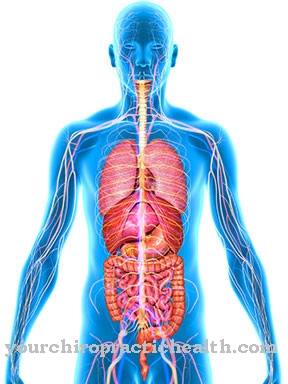
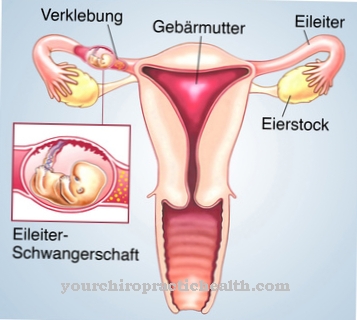
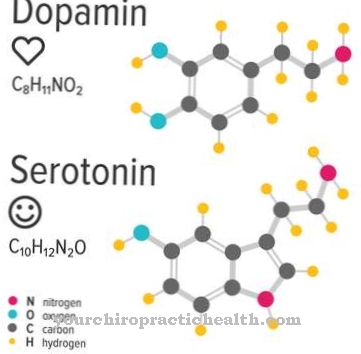
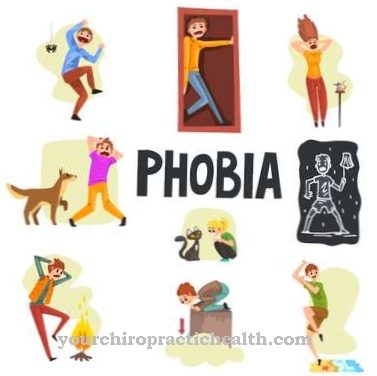
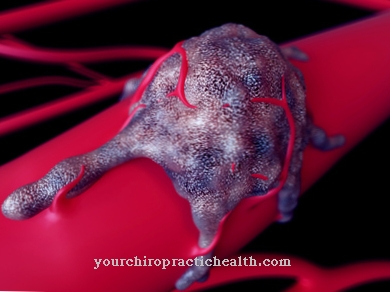
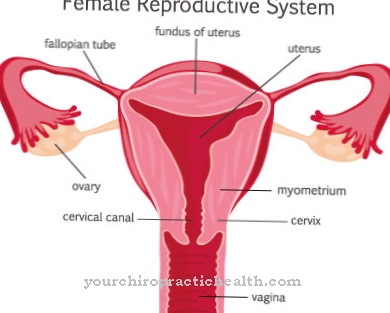






.jpg)

.jpg)
.jpg)











.jpg)